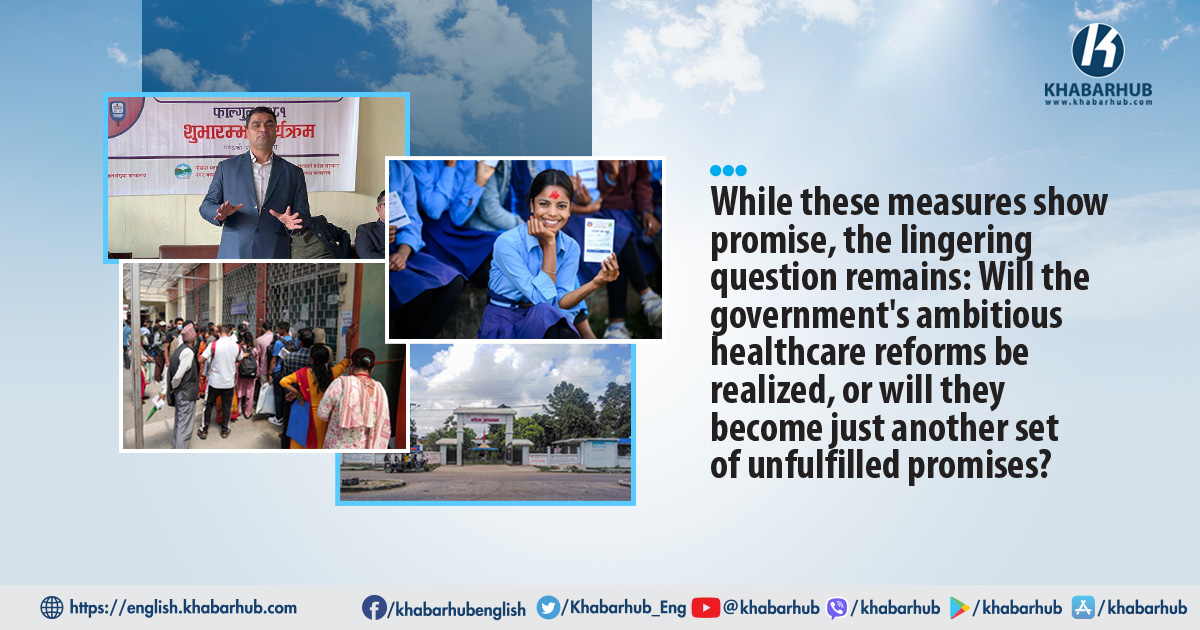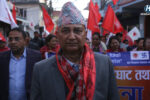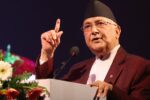KATHMANDU: A long-standing trend among ministers is the rush to announce action plans for popularity, often without a clear strategy for resource management.
This pattern has been seen before, including Prime Minister KP Sharma Oli’s ambitious promises to make the Prime Minister’s Office and Council of Ministers ‘paperless’ and to eliminate unnecessary taxes on ‘digital payments,’ both of which failed to materialize.
Similarly, Prime Minister Oli’s plan to establish health centers in all 753 local bodies during his second term has stalled.
Now, Health Minister Pradeep Poudel, who took office seven months ago, has announced 16 major initiatives.
While these plans have drawn attention, doubts are being raised about their feasibility and whether they will be anything more than empty promises.
Critics are particularly concerned about the lack of a clear resource management strategy.
Poudel, who is serving as the Health Minister for the first time, began his tenure with two key decisions: approving the National Cancer Control Strategy 2024-30 and introducing a plan to systematize the health insurance program.
He also vowed to eliminate long queues at federal hospitals within a month. Since then, Poudel has continued to roll out numerous plans to improve healthcare in the country, including initiatives for free treatment for various diseases.
If fully implemented, these measures could prevent countless deaths from treatable conditions.
However, skepticism abounds—are these just empty assurances for cheap popularity, or will they be genuinely executed?
Health experts warn that implementing these ambitious decisions will be a significant challenge.
Even within the Ministry of Health and Population, there is uncertainty about whether all the plans will come to fruition.
Ministry spokesperson Dr. Prakash Budhathoki claims that many services announced by Poudel have already been implemented to varying degrees.
However, he acknowledges that due to budget constraints, the government is unable to implement all decisions immediately.
Dr. Budhathoki pointed to several initiatives that have seen progress. For example, the “poor package” has been successfully implemented, benefiting chronic patients with treatment coverage up to one lakh rupees.
Additionally, the promised 50,000 rupees in support for kidney transplant recipients has been delivered.
He also noted that basic health services at the local level are now free, as they fall under the responsibility of local governments, while specialist services require payment.
The Ministry also highlighted the effectiveness of the One-Stop Crisis Management Center (OCMC), where victims of violence can access comprehensive services, from medical treatment to rehabilitation.
The program, now operating in over 100 hospitals across the country, is providing free treatment to victims.
Furthermore, the government is offering free healthcare services to the poor, helpless, and destitute through the Social Service Unit, based on their identity cards.
This also extends to families of martyrs and individuals injured during various people’s movements.
In addition, Minister Poudel’s ministry has confirmed that those injured in disasters and road accidents will receive free surgery, from simple to complex, with payment required only from those who can afford it after recovery.
While these measures show promise, the lingering question remains: Will the government’s ambitious healthcare reforms be realized, or will they become just another set of unfulfilled promises?
Progress and Challenges
Health Minister Poudel has been actively taking initiatives to implement various decisions aimed at improving the healthcare system.
Below is a summary of the key decisions made by Minister Poudel and their current status of implementation:
- Nine-point Plan to Improve Hospital Services
On July 15, 2024, Minister Poudel introduced a 9-point decision to enhance hospital services. The plan included measures such as operating OPD services in two shifts, adding service counters to manage patient crowds, implementing online ticketing and electronic payment systems, and establishing help desks and grievance redressal mechanisms.
While these measures have been announced, complaints persist about the lack of effective implementation, leaving patients still waiting for tangible improvements.
- Cancer screening and treatment in all seven provinces
On assuming office, Minister Poudel decided to expand cancer screening and treatment across all seven provinces.
The initiative aims to ensure that cancer treatment is available at least in one federal and provincial hospital in each province.
The ministry claims that this decision has been successfully implemented in all seven provinces, extending cancer services beyond Bagmati and Lumbini.
- Free treatment for burn victims
On August 26, 2024, the minister announced that burn treatment would be provided free of charge.
A procedure was prepared and approved, allowing free treatment for indigent burn victims. Under this plan, burn patients are to receive primary care at district hospitals, with more advanced treatment available at central hospitals.
The ministry reports that a 15-bed burn ward has been set up at Bir Hospital, and free burn treatment services have begun at Kirtipur Hospital.
- Free vaccination against cervical cancer
The government introduced a free vaccination campaign for cervical cancer targeting girls aged 10 to 14. This nationwide vaccination drive is currently underway.
- Expansion of Heart Disease Treatment
The government decided to expand heart disease treatment services to one hospital in each province.
Heart disease treatment has been launched in Madhes and Gandaki Provinces with support from Shaheed Gangalal National Heart Center.
However, the expansion to other provinces has been delayed due to various reasons, despite correspondence being sent to the remaining provinces.
- Free health check-ups for national players
In August last year, Minister Poudel announced that national players participating in international competitions would receive free annual health check-ups.
The Shaheed Gangalal National Heart Center has already begun providing these check-ups.
- Hello Health Hotline
A hotline, Hello Health 1115, was established to address complaints regarding the Ministry of Health and its institutions.
According to the minister’s secretariat, over 200 complaints have been resolved through this service.
- Equipment repair work
The Innovation Center has been working on repairing medical equipment in various hospitals, including Bir Hospital, Gangalal Hospital, Narayani Hospital, and Koshi Hospital.
The center is also compiling a list of equipment that cannot be repaired domestically, which will need to be imported.
- Newborn screening services
Minister Poudel’s decision to implement newborn screening for various congenital diseases, including thyroid, hearing, jaundice, and vision problems, has faced challenges in full implementation.
While general screenings for some conditions are conducted in hospitals, health posts and birthing centers only offer limited screenings and refer newborns with potential issues to specialists. Full implementation of the screening services remains a work in progress.
- Free Treatment for Sickle Cell Disease
Minister Poudel has claimed that free treatment for sickle cell disease, which primarily affects the Tharu community, has been resumed.
A dedicated sickle cell ward has been set up at Bheri Hospital in Nepalgunj, Banke, as well as a sickle cell hospital in Bardiya, targeting the regions where the Tharu community is predominantly settled.
- Free treatment for childhood cancer
The government began providing free treatment for children under 14 suffering from cancer.
Bhaktapur Cancer Hospital, Kanti Children’s Hospital, and Patan Hospital have been offering this service.
The ministry reports that approximately 1,200 children have received free cancer treatment.
Additionally, St. Jude University is supplying 35 types of medicines for cancer treatment, with the first shipment expected to arrive in Nepal within a week.
- Free Chemotherapy
The government is actively seeking donors to provide free chemotherapy treatment.
Relief, an organization offering assistance for paralysis treatment, has already contributed, and the ministry is preparing to roll out free chemotherapy services once a donor is secured.
- ‘Healthy Nepal: Next Generation, Healthy Generation’ campaign
The ministry is running a nationwide campaign aimed at promoting a healthy lifestyle.
Efforts include the establishment of physical exercise areas in parks and the introduction of yoga.
The ministry’s spokesperson, Dr. Prakash Budhathoki, emphasized initiatives to reduce tobacco use, such as requiring tobacco products to carry a 100% hazard symbol, restricting sales in public places, and preventing sales to children and pregnant women.
Under this campaign, free screenings for cancer, kidney disease, cardiovascular issues, and diabetes are currently underway to promote early detection.
Additionally, programs measuring body weight in relation to height are being implemented to prevent long-term health complications.
- Free transportation for women health volunteers
The ministry has partnered with the Transport Federation to provide free transportation for women’s health volunteers nationwide.
No separate budget allocation is required for this initiative, which has already been successfully implemented.
- Electronic medical records
Efforts are underway to streamline healthcare services by implementing a system for electronic medical records.
Currently, patients often need to repeat tests and procedures when visiting different hospitals.
Once implemented, this system will allow patients to carry their identification number or card to access their test reports and medical history, eliminating the need for repeated checks.
This initiative will begin in government health institutions, with plans to gradually include private healthcare providers.
- Increasing health insurance coverage to Rs 500,000
Minister Poudel previously announced an increase in health insurance coverage from one lakh rupees to five lakh rupees.
The ministry is currently revising the health insurance system in accordance with this decision.
The health insurance reform committee has submitted its report, which has been briefed to the Prime Minister.
Once the necessary amendments to the Health Insurance Act and regulations are passed by the current parliament, the increased coverage will be implemented.
Feasibility of Minister Poudel’s announcements
Despite these promising announcements, there are concerns about the feasibility of implementing these initiatives.
Ministry spokesperson Dr. Budhathoki acknowledged that just because a service is declared “free” does not mean it is fully sustainable.
He pointed out the government’s limited financial resources and the increasing pressure on healthcare services.
The government is focusing on preventive measures and public awareness campaigns to reduce patient numbers and treatment costs in the future, thus easing the burden on the healthcare system.
He stated that the ministry is actively seeking donors, both foreign and domestic, to provide essential medicines.
He mentioned that approximately 500 to 600 patients are in need of treatment for specific conditions, and efforts are being made to secure the necessary resources through donations.
Challenges in implementation
One of the key challenges in implementing the decisions announced by Health Minister Poudel is the budgetary constraints, according to the ministry.
Dr. Budhathoki explained that the decisions were made after the current budget had been allocated, making it difficult to implement many of them immediately.
He indicated that similar programs introduced during the previous minister’s tenure are now being incorporated into the upcoming budget for full implementation.
The ministry also noted that while some free services, particularly for burn treatments, have been introduced, they remain limited due to financial constraints.
Approximately Rs 100 to 110 million have been allocated this year for burn treatment services, and the government is working to expand this provision by including additional funds in the next year’s budget.









Comment